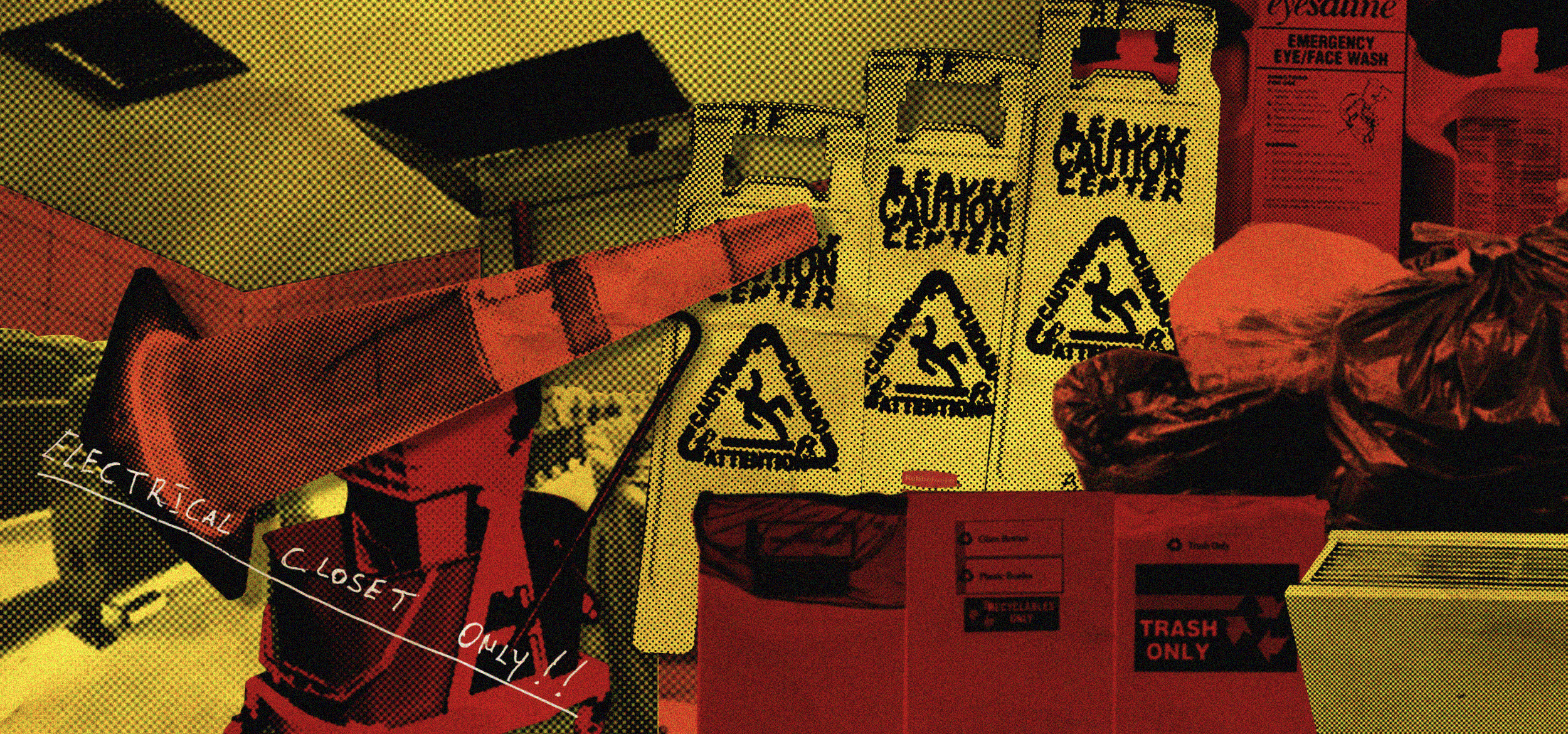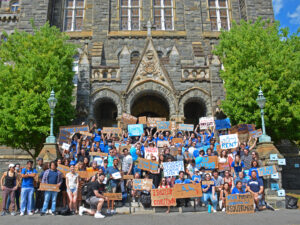Georgetown has relied on Jose Chanchavac to fix its broken heating, ventilation, and air conditioning (HVAC) systems for 28 years—longer than most current Hoyas have been alive. His son and daughter both attended Georgetown; his life is deeply entwined with this university.
“When a student says, ‘I don’t have heat or cooling,’ it’s like my son or daughter saying that I don’t have heating or cooling,” Chanchavac said. “I care about them.”
Yet facilities workers like Chanchavac have described Georgetown as an increasingly hostile working environment, particularly since the pandemic began. Many long-time facilities workers consider the last year one of the worst for labor relations in recent memory. Since October, the Voice has interviewed and met with dozens of workers, who have spoken of systematic problems in facilities management, including punitive behaviors, racial discrimination, unfilled vacancies, and insufficient union support.
“Georgetown used to be a great place to work, but not so much anymore,” Chanchavac said.
Chanchavac highlighted a Jan. 14 incident as indicative of the systematic mistreatment he’s encountered. After receiving a work order for a broken HVAC system in Henle, Chanchavac found the offending thermostat had simply been turned down. He increased the temperature and, upon feeling warm air, left to help a junior technician.
After later being alerted that the HVAC system was still malfunctioning, Chanchavac asked another technician to check it. That technician reported a parts issue that required supervisor approval, meaning the problem would have to wait until Monday.
Two days later, Chanchavac received a notification from his supervisor: The university was mandating employees come in to clear the snow, expecting a snowstorm. Chanchavac, having already worked the minimum 40 hours stipulated in the union agreement, told a group chat of fellow technicians that he wasn’t available to work due to a personal emergency.
Chanchavac believes he was retaliated against for this text message. On Jan. 27, he was written up for the Jan. 14 HVAC repair—which he alleges could not be completed without access to mechanical parts requiring supervisory approval. Although the report officially listed “poor work performance” as the cause, Chanchavac sees the write-up as retribution for his text, which he says his supervisor viewed as insubordination.
As a university spokesperson noted, the collective bargaining agreement (CBA) with the union stipulates that employees may not be subject to retaliation for “reporting their concerns or participating in grievance procedures in good faith.”
Write-ups have long-term impacts—Chanchavac considers the warning a significant hindrance to his ability to pursue supervisory promotion.
“I think they wrote me up based on retaliation,” he said. “Georgetown preaches values: respect and dignity. But they don’t respect us.”
Many facilities workers have echoed Chanchavac’s sentiment about a fundamental lack of respect and support from Georgetown’s management.
“We deeply appreciate all that our facilities workers do to support our university community. Georgetown is committed to protecting the health and safety, and respecting the dignity, of all members of our community,” a university spokesperson wrote in an email to the Voice.
Georgetown’s facilities department is characterized by a complex hierarchical leadership structure. A handful of administrators—like Associate Vice President of Facilities Lisa Belokur, whom several workers identified as responsible for unpopular policies—preside over department directors and dozens of supervisors, who in turn oversee roughly 300 facilities workers.
Several workers also described clear dichotomies between supervisors who are “against workers” or “on the side of workers”—many of the latter have left Georgetown in the last few years.
Several custodial workers and HVAC technicians believe management has done a poor job of building employee relationships, resulting in a fear of retaliation and hostility. Most interviewed workers testified to key supervisors never introducing themselves or ignoring workers, despite the substantial control they have over the workers’ daily lives.
“Big boss is going to come and it’s going to be a problem,” another facilities worker said, describing an intimidation tactic employed by supervisors to threaten getting upper managers like Belokur involved.
According to several facilities workers, supervisors also began to routinely implement punitive consequences for small infractions, furthering the lack of community support. Being minutes late resulted in docking missed time from vacation days or pay, while previous supervisors had allowed workers to recoup the time at the end of their shift, even if the CBA does not permit tardiness.
“The workers’ basic problem is with upper management who doesn’t respect us,” one custodial worker said.
Another long-term custodial worker perceived a disregard for worker safety from missing COVID-19 PPE early in the pandemic. Once, when he brought up concerns to a supervisor, the response from upper management was deflating: “They should be happy they have a job here.”
Moreover, some workers have alleged racial discrimination and serious underlying racial tensions. Many workers noted a stark racial partition between shifts, as most maintenance and housekeeping day workers are Latino, while the vast majority of night workers are Black. In contrast, top management is largely white. The resulting dynamic is one where Black and Latino workers are often pitted against one another to the detriment of both.
Chanchavac, who is Latino, has lodged a number of complaints to the Institutional Diversity, Equity & Affirmative Action (IDEAA) office. Multiple Latino maintenance workers also alleged supervisors were unfairly harsh on Latinos over the usage of their supply closets, and one Black worker believed the Black workers did not have equal access to overtime availability over the summer.
“Any report of discrimination or retaliation is taken seriously and investigated by the university,” a university spokesperson wrote.
Most of the workers who spoke with the Voice are also immigrants who often face language barriers in accessing legal support and self-advocacy. Many rely on stable hours and overtime, often balancing multiple jobs to meet the high cost of living in D.C. When shifts are inconsistent, workers’ lives are drastically impacted. One worker testified to how some employees even changed their children’s schooling to accommodate changed shifts.
Yet despite management promising shift changes would end post-pandemic, two housekeeping workers alleged that they were forced, yet again, to change shifts at the threat of dismissal. “Either you move or you get fired. They don’t give a fuck,” one put it simply.
Overtime access has been a sore spot for workers. One long-time custodial worker identified barriers to overtime hours during May 2022’s graduation as one managerial turning point, noting that she’d worked overtime for every graduation prior. The limited access to overtime hours in recent years has exacerbated workers’ economic insecurity and reduced the quality of facilities maintenance.
Many believe the more prominent utilization of subcontractors—including those associated with SSC Services for Education—factors into this picture, especially for HVAC technicians.
“We use contractors in limited circumstances to support the work of the Office of Planning and Facilities Management,” a university spokesperson wrote.
The scope of work has also drastically changed. In the past, housekeeping workers would be assigned in pairs to clean a building for their safety. Now, however, several workers testified to being assigned an entire floor or two on their own.
Supervisors have allegedly also reduced the availability of quality cleaning supplies or refused to replenish old stock, making janitorial work more difficult and less thorough. “If you don’t have cleaning supplies, how is the place going to be cleaned?” one worker said.
The increased workload has been compounded by worker shortages, as Georgetown has not rehired staff post-pandemic. “Georgetown University employees, they leave, they go away, they die, or they retire, or they go somewhere else, but they don’t fill the vacancy, and that means more work for us,” Chanchavac said.
According to Chanchavac, there used to be more than 30 people employed in the HVAC department. Now, there are about a dozen. Many current workers assume the extra workload—Chanchavac says that five AC mechanics are responsible for all of the main campus. To compensate, workers allege that supervisors have assigned non-licensed workers the responsibilities of licensed technicians without corresponding pay increases.
The university’s treatment of workers has long been criticized by workers and students. In 2018, the Hoya reported that facilities workers faced similar mistreatment and had failed to catalyze change through standard complaint channels to supervisors, managers, human resources, or union representatives.
The union for all trade and facilities workers—1199 Service Employees International Union (SEIU)—hasn’t always provided clear solutions. Although Chanchavac contacted his union representative, organizer Angel de la Rosa Pena, they were unsuccessful in withdrawing his write-up after Georgetown dismissed his grievance.
Other workers have responded derisively when asked about whether the union has been helpful in navigating their challenges. “I’d rather be without a union than pay $100 every two weeks because they’re not helping,” one maintenance worker said, a sentiment echoed by many. “We are the union.”
In the past year, union organizers have handled around a half-dozen formal grievances and 15-20 general complaints. De la Rosa Pena noted he holds weekly on-campus meetings with workers, although from his perspective the greatest challenge is poor communication. The union receives few formal grievances, limiting their capacity to respond.
1199 SEIU Vice President Carrietta Hiers highlighted another limiting factor for union help: the difference between a grievance and a gripe. Grievances, or violations of the union’s CBA, are subject to a stricter adjudication process involving human resources, while gripes are processed on a looser timeline and involve a labor-management meeting.
Certain issues, like hostility, toe the line. “It’s not a violation of the contract but it’s frankly disrespectful, which creates a hostile work environment, which is a violation of the CBA,” Hiers said.
Hiers and de la Rosa Pena believe bringing supervisors (whom they generally view as “pro-worker”), union representatives, and workers to the communication table might address many of the issues workers are experiencing. “That’s what the union is for: to improve the lives of our members. And if we’re a tool and a resource for them, that’s what we’re for,” Heirs stressed.
But absent greater institutional support, workers have turned to one another for solutions. “We’ve got to do this together,” one Black custodial worker said. One AC maintenance worker explained that if he could afford legal representation to support the experiences of Latino housekeeping day workers, he would.
“We don’t really complain because a lot of us fear we may lose our jobs,” one facilities worker said.
To help, student organizers like Xavi Molina (CAS ’25) and Josh Gavsie (CAS ’24) and the Georgetown Coalition for Workers’ Rights have been key in stirring university response to the ongoing complaints. Initially formed in 2020 to support food workers and protest the implementation of Redeploy Georgetown, a policy that workers claimed forced them to be COVID-19 public health screeners, the coalition has expanded its scope to focus on workers’ rights issues across campus.
At Georgetown, student organizing has been instrumental in pushing ethical reform on labor rights, as evidenced by the 2005 student hunger strike to achieve livable wages for Georgetown employees and 2011 solidarity efforts to support unionization of Leo’s workers.
Many workers see their mistreatment as directly connected to student experience. “This is not fair, as far as I’m concerned, for the students. If I had a child coming here, I would raise bloody hell!” one custodial worker said.
According to student organizers, beyond pushing for better working conditions at the policy level, the coalition also aims to deepen relationships between students and workers. Since October, the Voice has attended the coalition’s weekly worker meetings held to create tangible, face-to-face connections.
“A lot of the success that Georgetown has historically had with its labor organizing has come from student and worker solidarity,” Gavsie said. “Our main priority last semester was how do we rebuild that? How do we form connections with these staff?”
Molina was emphatic that ultimately, building relationships is critical to forcing change. “They’re our neighbors and that means they’re our family,” Molina noted. “Your responsibility is to be part of their community.”
Gavsie cited the recent Georgetown Protects Racists protests as an example of successful student organizing efforts.
“We’re going to need a lot of people calling the administration on their shit,” Gavsie said of upcoming contract negotiations. “Every student has a role to play.”
“That’s the magic of student organizing,” Molina added. “We can be as mouthy as we want.”
Editor’s note: This story was corrected to reflect Molina’s membership in the College of Arts and Sciences.






I’ve had Kevin Chanchavac fix my AC before and he was such a down-to-earth guy who genuinely cared about fixing our problem. You could easily tell he was stressed out with the amount of work being delegated to him due to the lack of a significant HVAC technician team. I wish him nothing the best, workers like him are what make the running of this University possible.
The ignoring, lack of support, and lack of respect are all issues students at Georgetown deal with also.